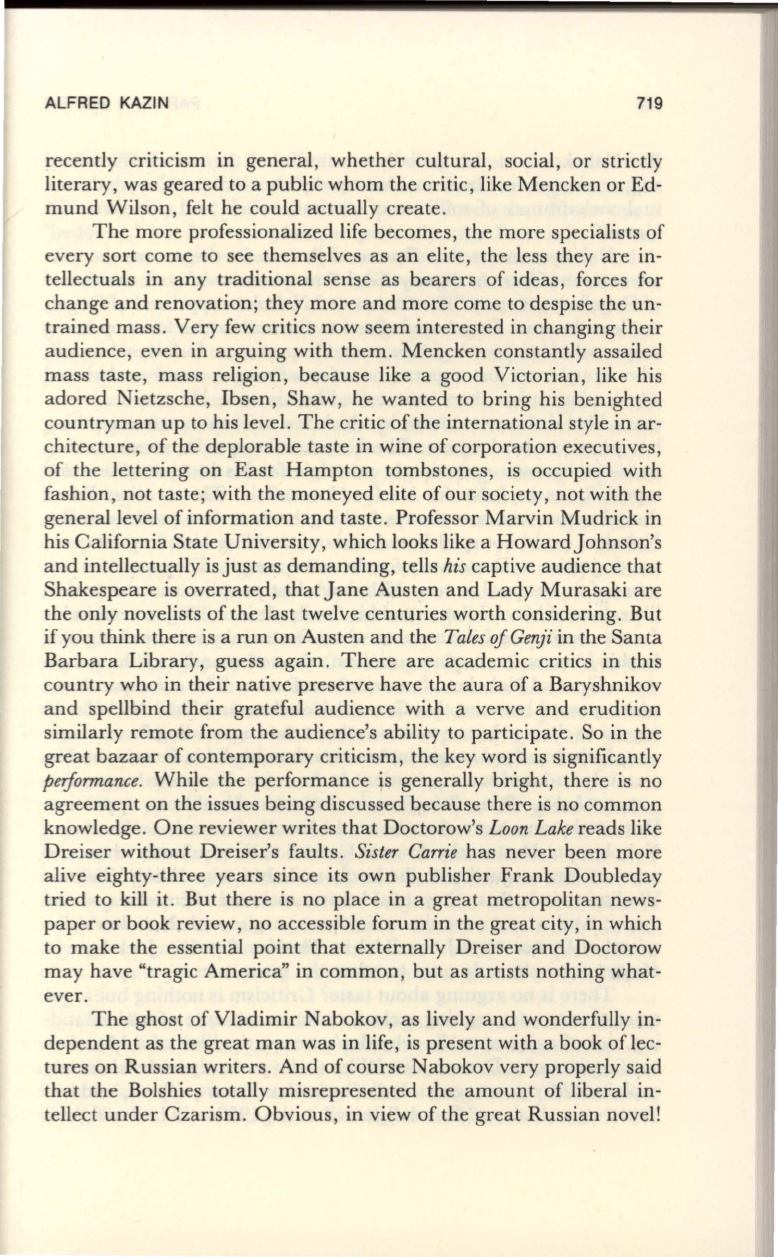
ALFRED KAZIN
719
recently cnttctsm in general, whether cultural, social, or strictly
literary, was geared to a public whom the critic, like Mencken or Ed–
mund Wilson, felt he could actually create.
The more professionalized life becomes, the more specialists of
every sort come to see themselves as an elite, the less they are in–
tellectuals in any traditional sense as bearers of ideas, forces for
change and renovation; they more and more come to despise the un–
trained mass . Very few critics now seem interested in changing their
audience, even in arguing with them . Mencken constantly assailed
mass taste , mass religion, because like a good Victorian, like his
adored Nietzsche, Ibsen, Shaw, he wanted to bring his benighted
countryman up to his level. The critic of the international style in ar–
chitecture, of the deplorable taste in wine of corporation executives,
of the lettering on East Hampton tombstones, is occupied with
fashion, not taste; with the moneyed elite of our society, not with the
general level of information and taste. Professor Marvin Mudrick in
his California State University, which looks like a Howardjohnson's
and intellectually is just as demanding, tells
his
captive audience that
Shakespeare is overrated, that Jane Austen and Lady Murasaki are
the only novelists of the last twelve centuries worth considering. But
if you think there is a run on Austen and the
Tales
of
Gen:fi
in the Santa
Barbara Library, guess again . There are academic critics in this
country who in their native preserve have the aura of a Baryshnikov
and spellbind their grateful audience with a verve and erudition
similarly remote from the audience's ability to participate. So in the
great bazaar of contemporary criticism, the key word is significantly
performance.
While the performance is generally bright, there is no
agreement on the issues being discussed because there is no common
knowledge . One reviewer writes that Doctorow's
Loon Lake
reads like
Dreiser without Dreiser's faults.
Sister Carrie
has never been more
alive eighty-three years since its own publisher Frank Doubleday
tried to kill it. But there is no place in a great metropolitan news–
paper or book review, no accessible forum in the great city, in which
to make the essential point that externally Dreiser and Doctorow
may have "tragic America" in common, but as artists nothing what–
ever.
The ghost of Vladimir Nabokov, as lively and wonderfully in–
dependent as the great man was in life, is present with a book of lec–
tures on Russian writers . And of course Nabokov very properly said
that the Bolshies totally misrepresented the amount of liberal in–
tellect under Czarism. Obvious, in view of the great Russian novel!


